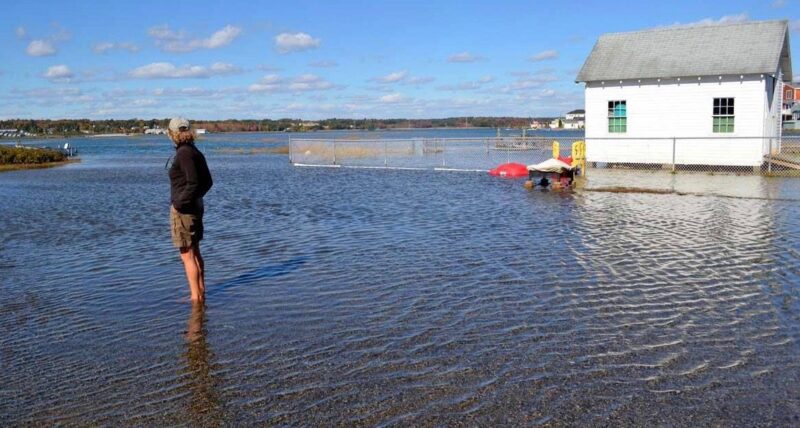Editor’s Note: The Maine Climate Council is submitting its Climate Action Plan to the Legislature on Dec. 1. Topics related to the plan have been covered in a series of Sea Change columns this fall.
Alongside the challenges of a raging pandemic, failing health care system, struggling economy and systemic racism, President-elect Joe Biden faces what he calls “the battle to save the planet.” He has promised to “marshal the forces of science and the forces of hope,” demanding substantive climate action across the federal government.
Tackling the climate crisis in a cohesive, interagency manner is precisely what the Maine Climate Action Plan recommends, harnessing the expertise of more than 15 governmental and quasi-governmental entities along with “outside stakeholders.”
Having federal and state governments share a coordinated response to climate could markedly accelerate Maine’s progress reducing carbon emissions and fostering climate resilience.
“Synergy between state and national policy-makers,” said Pete Didisheim, advocacy director for the Natural Resources Council of Maine, “would help bring business aboard, align state and federal programs, and smooth and accelerate what will be the biggest and fastest change to our energy systems in human history.”
Ripple effects from federal policy changes
Biden plans to reverse many of the Trump administration’s more than 100 regulatory rollbacks. Among the regulations likely to be restored are higher fuel economy standards, and improved efficiency standards for buildings and appliances.

Revived federal standards in those sectors could help Maine tackle its two dominant sources of carbon pollution. Transportation accounts for just over half of Maine’s greenhouse gas emissions, while another 30 percent comes from the heating, cooling and lighting of buildings.
Maine’s Climate Action Plan already calls for “support of increased federal fuel efficiency standards” and an incentive program to help low- and moderate-income residents upgrade to higher efficiency vehicles. The plan also recommends that Maine phase in more energy-efficient building codes and join other states in adopting efficiency standards for appliances not yet covered – like computers.
RELATED: The drive toward vehicle electrification in Maine
Beyond aligning with state strategies, improved federal standards will give industries much-needed consistency. The Trump administration’s rollback of automobile fuel-economy standards and a subsequent lawsuit by states (including Maine) to retain higher standards split the auto industry and cost – by the administration’s own admission – nearly 13,500 jobs.
Helping the economy
A new report, Strengthening Maine’s Clean Energy Economy, underscores the importance of “federal policies and funding” – like tax credits for solar and wind investments and on electric vehicles – to “provide stability and investment opportunity.”
Those tax credits are declining; residential solar tax credits will fall to 10 percent in 2022, down from a high of 30 percent in 2019, and electric vehicles from major manufacturers like Tesla and GM no longer qualify for tax credits.

The Biden administration is likely to propose increased clean-energy tax credits and has committed to greatly expand charging infrastructure for electric vehicles, moves that could help Maine residents benefit from locally generated renewable power and cleaner vehicles that are affordable to operate and maintain.
Biden also supports creation of a national green bank, a nonprofit or quasi-governmental institution that uses public funds to stimulate private investment in clean energy and climate adaptation. Maine’s Climate Action Plan recommends consideration of a statewide green bank that could receive federal support if a national counterpart is created.
RELATED: Green bank could help Maine turn tide on fossil fuel dependency
By valuing climate science, the Biden administration will advance research and development efforts in Maine directly and indirectly. The past four years have brought “significant damage to our science apparatus at the national level,” said Deborah Bronk, president of the nonprofit Bigelow Laboratory for Ocean Sciences, under an administration that “actively worked to reduce or discourage research into earth system science and climate change” and “threatened long-term environmental data sets.”
Bronk expects that trend to reverse under the new administration, and hopes researchers in Maine – who are highly dependent on federal support due to the state’s limited financial capacity – will see expanded opportunities.
Potential Senate roadblocks
Biden’s plan to invest $2 trillion supporting clean energy, infrastructure and communities (particularly those traditionally underserved) will likely be hamstrung if the Senate remains under Republican control, which will be decided by Georgia’s two election runoffs Jan. 5. “The ambitions of the Biden administration are sizable and exciting,” Didisheim said, “and would be more difficult to realize in a divided government scenario,” which would offer “fewer opportunities to partner with states.”

The Biden administration could potentially incorporate climate projects into a COVID-19 relief package, particularly with measures that have some bipartisan support already, such as infrastructure, renewable energy development and carbon storage through regenerative agriculture and sustainable forestry. A similar approach succeeded in the 2009 economic recovery act, when several Republican senators supported a $90 billion investment in clean energy.
Once in office, Biden could – under the National Emergencies Act – declare the climate crisis an emergency, an option that progressive groups advocate using should Senate gridlock halt progress, to free resources for clean energy development, weatherization and grid modernization. Several progressive leaders have proposed a work-around in which the Biden administration could team up with the Federal Reserve Bank and Treasury Department to issue low-interest loans across a wide geographic area to help achieve climate equity and resilience goals.
RELATED: Needed: A federal climate plan
As the Biden administration starts to integrate climate considerations across federal agencies, Maine will be better prepared to take advantage of opportunities — given the extended collaborative effort that went into preparing its statewide climate plan. From the scientific summary and far-reaching strategies to the economic considerations and equity assessment, the Maine Climate Council has laid a solid groundwork.
“What makes me optimistic and confident,” said Roger Stephenson, Northeast advocacy director for the Union of Concerned Scientists, is that Maine’s Climate Action Plan – to his knowledge – is the “product of the largest, most diverse and knowledgeable group of stakeholders ever brought together to solve a problem in Maine.”
That planning process, he added, benefited greatly from “consistent leadership” under Gov. Janet Mills. After Jan. 20, Maine can finally count on federal climate leadership as well.




